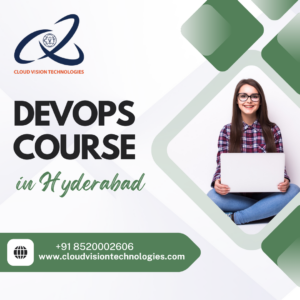Introduction to DevOps:
DevOps Course in Hyderabad is a set of practices that combines software development (Dev) and IT operations (Ops) to shorten the development life cycle while delivering high-quality software. It emphasizes collaboration, automation, continuous integration, continuous delivery (CI/CD), and monitoring to improve efficiency and reliability. In the fast-paced world of software development, DevOps helps organizations innovate faster and maintain competitive advantages by fostering a culture of shared responsibility and continuous improvement. Cloud Vision Technologies.

What is DevOps?
DevOps is not a tool or a technology but a cultural shift that promotes collaboration between development and operations teams. Traditionally, these teams worked in silos, leading to inefficiencies and longer release cycles. DevOps aims to break down these silos by encouraging continuous feedback, automation, and seamless integration of processes. By aligning development and operations, organizations can release software faster, reduce errors, and improve overall performance.DevOps Course in Hyderabad.
DevOps is more than just a set of tools or processes; it is a cultural shift that transforms how organizations build, deploy, and manage software. By enabling faster releases, improved collaboration, stronger security, and scalability, DevOps empowers businesses to stay ahead in competitive markets. For IT professionals, mastering DevOps opens up exciting career opportunities and continuous growth. Whether you are an organization aiming for operational efficiency or an individual seeking career advancement, adopting DevOps can be a game-changer. DevOps Course in Hyderabad.
Why Choose DevOps?
In today’s fast-paced digital world, businesses need to deliver software and services quickly, reliably, and securely. DevOps has emerged as a transformative approach that combines development (Dev) and operations (Ops) to streamline software development and deployment processes. By fostering collaboration, automation, and continuous improvement, DevOps helps organizations achieve faster releases, higher software quality, and improved customer satisfaction. Whether you are a business looking to optimize operations or an IT professional aiming for career growth, DevOps offers numerous compelling advantages. Here are key reasons why choosing DevOps can be a game-changer. DevOps Course in Hyderabad.
Faster Software Delivery
One of the primary goals of DevOps is to accelerate the software development lifecycle. In traditional development models, lengthy development and deployment cycles often lead to delayed releases. DevOps addresses this by automating repetitive tasks such as building, testing, and deploying software. With Continuous Integration (CI) and Continuous Delivery (CD) pipelines, code changes are automatically built, tested, and deployed to production environments. This automation reduces deployment times from weeks to hours or even minutes, allowing businesses to release updates more frequently. Faster delivery keeps products competitive and responsive to user feedback, enabling companies to maintain a strong market presence. DevOps Course in Hyderabad.
Improved Collaboration and Communication
In many organizations, development and operations teams work in silos, leading to miscommunication and delays. DevOps fosters a culture where these teams collaborate closely throughout the software lifecycle. By sharing responsibilities and accountability, teams can address issues proactively, resolve problems faster, and improve overall efficiency. This enhanced collaboration results in a more cohesive work environment, better teamwork, and higher employee satisfaction. Breaking down these silos encourages innovation and helps organizations adapt more quickly to market changes. DevOps Course in Hyderabad.
Enhanced Software Quality
Quality is a crucial factor in software development. DevOps emphasizes continuous testing and feedback, ensuring that code is thoroughly tested at every stage of the development process. Automated testing frameworks catch bugs and performance issues early, preventing costly fixes later in the production stage. Continuous monitoring tools such as Prometheus and ELK Stack provide real-time performance insights, enabling faster issue resolution. As a result, businesses can deliver more reliable and stable software that improves user satisfaction and retention. DevOps Course in Hyderabad.
Increased Efficiency through Automation
Automation is the cornerstone of DevOps. From infrastructure provisioning and configuration management to testing and deployment, automation eliminates human error, saves time, and increases consistency. Tools like Jenkins, Docker, Kubernetes, and Ansible enable organizations to automate complex workflows, allowing teams to focus more on innovation rather than repetitive tasks. Automated processes also ensure that systems are more reliable, scalable, and easier to manage, ultimately enhancing organizational efficiency.
Scalability and Flexibility
In today’s dynamic business environment, scalability is crucial to meet changing demands. DevOps practices enable organizations to scale infrastructure and applications quickly, adapting to fluctuating workloads. Infrastructure as Code (IaC) allows for automated provisioning of infrastructure, making it easy to scale up or down as needed. This flexibility ensures minimal downtime, optimized resource utilization, and improved system resilience. Whether handling seasonal traffic spikes or scaling down during off-peak periods, DevOps provides the agility needed to maintain optimal performance. DevOps Course in Hyderabad.
Stronger Security and Compliance
Security is a top priority in modern software development, and DevOps integrates security from the outset. DevSecOps, a key extension of DevOps, emphasizes incorporating security practices into every stage of the development lifecycle. Automated security checks, vulnerability assessments, and compliance audits ensure that potential threats are detected and mitigated early. Tools like AWS Shield and Azure Security Center help protect against cyberattacks, while compliance with industry standards such as GDPR and ISO 27001 provides businesses with greater confidence in data protection. By embedding security into development processes, DevOps helps organizations maintain a robust security posture.

Career Opportunities and Growth:
For IT professionals, DevOps offers lucrative career opportunities and rapid growth potential. As organizations across industries adopt DevOps to improve efficiency and scalability, the demand for skilled DevOps engineers, automation specialists, and cloud professionals continues to rise. Certifications such as AWS Certified DevOps Engineer, Docker Certified Associate, and Kubernetes Administrator validate expertise and open doors to high-paying roles. Moreover, DevOps professionals often work on cutting-edge technologies, gaining exposure to the latest tools and frameworks, which further enhances their market value.
Continuous Learning and Innovation
DevOps encourages a culture of continuous learning and improvement. By embracing experimentation and learning from failures, teams are motivated to innovate rapidly and improve processes. This continuous feedback loop ensures that products evolve based on user needs and market trends. Moreover, DevOps teams often collaborate with other departments, gaining a broader understanding of business goals. This holistic perspective not only enhances personal growth but also contributes to organizational success.
Core Principles of DevOps
Collaboration: Collaboration is at the heart of DevOps. It emphasizes breaking down the traditional silos between developers, operations teams, and other stakeholders. By fostering open communication and shared responsibility, DevOps creates a culture where teams work together towards common goals. Regular meetings, shared dashboards, and collaborative tools help ensure everyone is on the same page, leading to faster problem resolution and better decision-making. DevOps Course in Hyderabad.
Automation: Automation is a crucial pillar of DevOps, aimed at reducing manual intervention in repetitive tasks. By automating processes such as testing, deployment, and infrastructure management, organizations can achieve higher efficiency and consistency. Tools like Jenkins, Ansible, and Terraform enable teams to streamline workflows, minimize human error, and accelerate software delivery, allowing developers to focus more on innovation. DevOps Course in Hyderabad.
Continuous Integration and Continuous Delivery (CI/CD): CI/CD practices ensure that code changes are automatically built, tested, and deployed to production environments. Continuous Integration (CI) helps detect and resolve bugs early by integrating code frequently, while Continuous Delivery (CD) ensures that validated changes are released to production smoothly. This approach enables organizations to deliver features and fixes rapidly, improving customer satisfaction and market responsiveness. DevOps Course in Hyderabad.
Infrastructure as Code (IaC): Infrastructure as Code (IaC) is a practice where infrastructure is managed and provisioned using code rather than manual processes. This approach allows organizations to version control, automate, and replicate their infrastructure across environments. Tools such as Terraform and AWS CloudFormation help ensure consistency, scalability, and faster recovery in case of failures. IaC reduces downtime and makes infrastructure management more efficient. DevOps Course in Hyderabad.
Monitoring and Feedback: Continuous monitoring and feedback are essential for maintaining system health and performance. DevOps promotes the use of monitoring tools such as Prometheus, ELK Stack, and Splunk to track performance metrics, logs, and user behavior in real time. Feedback loops allow teams to detect issues early, improve performance, and continuously enhance the user experience. By learning from past performance, organizations can implement changes that drive long-term improvements.
Benefits of DevOps:
Faster Software Delivery: One of the most significant advantages of DevOps is the acceleration of software delivery. By integrating automation, continuous integration, and deployment pipelines, organizations can release updates and new features more frequently. This rapid delivery enables businesses to respond to market demands quickly and gain a competitive edge. Faster releases also mean quicker feedback from users, which helps in refining products and services. DevOps Course in Hyderabad.
Improved Collaboration: DevOps fosters a culture where development, operations, and other teams work closely together. This collaborative environment eliminates the blame game often seen in traditional IT setups. Instead, teams share responsibilities, leading to better communication, faster issue resolution, and higher overall productivity. Collaboration tools and shared metrics ensure transparency and accountability across departments.
Enhanced Security: Security is a critical concern in software development, and DevOps integrates security practices from the early stages of the development cycle. Known as DevSecOps, this approach ensures that security testing and vulnerability assessments are automated and continuous. This early integration helps identify security flaws before they reach production, minimizing risks and protecting sensitive data. DevOps Course in Hyderabad.
Scalability: With the help of Infrastructure as Code (IaC) and container orchestration tools like Kubernetes, DevOps makes scaling infrastructure seamless. Whether it is handling a sudden spike in traffic or scaling down during low-demand periods, organizations can adjust resources dynamically. This flexibility optimizes resource utilization and keeps costs under control while maintaining performance. DevOps Course in Hyderabad.
Higher Quality: Continuous testing and integration in DevOps result in higher software quality. Automated testing identifies bugs early in the development cycle, reducing the cost and time required for fixes. Moreover, frequent releases and continuous feedback loops help teams to make incremental improvements, ensuring that the final product meets user expectations. By prioritizing quality at every stage, DevOps enhances user satisfaction and brand reputation. DevOps Course in Hyderabad.

Key Tools in DevOps:
Version Control: Version control systems are essential for tracking changes in code, collaborating with team members, and managing multiple versions of a project. Tools like Git, GitHub, and GitLab allow developers to maintain a history of code changes, roll back to previous versions if needed, and collaborate efficiently through branching and merging. These tools enable continuous integration by integrating code changes from multiple developers seamlessly. DevOps Course in Hyderabad.
CI/CD Tools: Continuous Integration and Continuous Delivery (CI/CD) tools like Jenkins, CircleCI, and GitHub Actions automate the software development pipeline. These tools help in building, testing, and deploying applications quickly and reliably. By automating these processes, organizations can reduce human error, accelerate delivery cycles, and maintain consistent deployment practices. DevOps Course in Hyderabad.
Containerization: Containerization tools such as Docker allow developers to package applications along with their dependencies into lightweight, portable containers. This ensures that the application runs consistently across different environments, from development to production. Docker simplifies deployment, reduces compatibility issues, and improves resource utilization. DevOps Course in Hyderabad.
Orchestration: Orchestration tools like Kubernetes are used to manage, scale, and automate the deployment of containerized applications. Kubernetes handles load balancing, scaling up or down based on demand, and ensuring high availability. It simplifies the management of complex microservices architectures, making it easier for organizations to scale applications without manual intervention.
Monitoring and Logging: Monitoring and logging tools are vital for maintaining system health and performance. Prometheus, ELK Stack (Elasticsearch, Logstash, Kibana), and Splunk provide insights into system metrics, logs, and application performance. These tools help organizations detect and resolve issues in real-time, optimize resource utilization, and improve the overall reliability of applications. DevOps Course in Hyderabad.
Use Cases of DevOps:
Web Application Development: Web application development benefits significantly from DevOps practices. Continuous deployment pipelines allow developers to release new features, bug fixes, and security patches quickly. Automated testing ensures code quality, while containerization ensures consistency across development, testing, and production environments. This leads to faster release cycles and a better user experience.
E-commerce: In the competitive e-commerce sector, high availability and quick updates are crucial. DevOps enables online retailers to scale infrastructure during peak seasons, such as holidays or sales events. Automated deployments and real-time monitoring ensure minimal downtime and seamless user experiences. Continuous feedback from customers helps in refining the platform continuously. DevOps Course in Hyderabad.
Financial Services: Financial institutions require high security, compliance, and reliability. DevOps practices help integrate security checks into the development pipeline (DevSecOps), ensuring that compliance standards are met. Continuous monitoring identifies potential threats early, while automated deployments help improve deployment speed without compromising security. DevOps Course in Hyderabad.
Healthcare: The healthcare industry deals with sensitive patient data and must adhere to strict regulatory standards. DevOps enables continuous improvement of health applications by automating compliance checks and security testing. This approach helps in delivering updates faster while maintaining data security and regulatory compliance.
Start ups: Start ups operate in dynamic environments where rapid iteration and deployment are critical for staying competitive. DevOps allows start ups to build, test, and deploy features quickly with minimal resources. Continuous feedback loops help in adapting to market demands, improving user satisfaction, and achieving faster growth. DevOps Course in Hyderabad.
Challenges and Considerations
While DevOps offers numerous benefits, it also comes with its own set of challenges. One of the primary hurdles is cultural resistance, where teams are reluctant to adopt new ways of working. Changing organizational culture requires leadership support, training, and continuous encouragement to break down silos and promote collaboration.
Tool Integration Complexity is another challenge, as organizations need to integrate various tools for version control, automation, testing, and monitoring. Ensuring these tools work seamlessly together requires expertise and careful planning. Poor integration can lead to delays and inefficiencies in the development pipeline. DevOps Course in Hyderabad.
DevOps Course in Hyderabad:
Hyderabad has emerged as a significant hub for IT and software development, with a growing demand for professionals skilled in DevOps. A DevOps course in Hyderabad offers aspiring IT professionals and developers the opportunity to learn the latest tools, techniques, and methodologies to bridge the gap between software development and IT operations. These courses focus on essential DevOps principles such as automation, continuous integration/continuous delivery (CI/CD), infrastructure as code (IaC), and monitoring. By enrolling in a DevOps program, learners can gain hands-on experience with industry-standard tools like Jenkins, Docker, Kubernetes, Git, and AWS, ensuring they are job-ready. DevOps Course in Hyderabad.
Hyderabad is home to numerous IT giants, start ups, and multinational companies (MNCs), making it an ideal location for learning and career growth in DevOps. Training institutes in the city offer both online and offline courses, catering to students, working professionals, and job seekers. These courses are designed to provide practical, hands-on experience through live projects, case studies, and real-world simulations. Moreover, many institutes offer placement assistance, helping learners secure job opportunities in top companies.

Conclusion:
DevOps is more than just a methodology; it is a transformative approach that aligns people, processes, and technology to achieve better software delivery outcomes. By embracing DevOps principles, organizations can innovate faster, improve reliability, and maintain a competitive edge in the digital age. Whether it’s a startup or a large enterprise, adopting DevOps practices is essential for thriving in today’s fast-paced technological landscape.
DevOps Course in Hyderabad is more than just a methodology; it is a transformative approach that aligns people, processes, and technology to achieve better software delivery outcomes. By embracing DevOps principles, organizations can innovate faster, improve reliability, and maintain a competitive edge in the digital age. Whether it’s a startup or a large enterprise, adopting DevOps practices is essential for thriving in today’s fast-paced technological landscape.
Address: Cloud Vision Technologies
Location: Samhitha Enclave, 3rd floor, KPHB Phase 9, Kukatpally, Hyderabad, Telangana – 500072
Contact Number : +91 8520002606
Mail ID: info@cloudvisiontechnologies.com
Website: https://cloudvisiontechnologies.com




